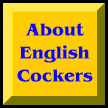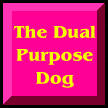




History of the
English Cocker in the Field
The following was taken from the Spanie-L List, January 11, 1997 with the
permission of the author, Robin Burk:
Referenced from the Jubilee Book of the ECSCA, Inc.
Abbreviations:
ACS = American Cocker Spaniel
ECS = English Cocker Spaniel
ESS = English Springer Spaniel
Given the evolution of field trialing AND of the ECS breed in the US,
it might help to go back a bit when discussing dual champions among the
English Cockers.
According to the Jubilee Book of the English Cocker Spaniel Club of America,
the first official field trial for spaniels in any country was held in England
at Sutton Scarsdale in 1899. The stake was won by Stylish Pride, a Cocker
who was registered but not a bench champion.
Among subsequent show dogs that won at field trials in subsequent decades,
the black bitch Eng. Ch. Jetsam Bowdler, wh. 1903, had a major impact on
the breed and was still winning Challenge Certificates in 1911. Although
as few as 2 field trials were held a year in England, by 1908 Walhampton
Judy, a blue roan bitch wh. 1905 and sired by show dog Eng. Ch. Rufus Bowdler.
BTW, Walhampton Judy is behind the very famous US ECS conformation stud
Ch. Dunelm Galaxy, whose offspring permeate nearly all of the parti-colored
show champions in the US.
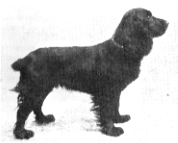
Eng. Ch. Jetsam Bowdler
The (British) Kennel Club ruled that beginning in mid-1909, all gundog breeds
would have to have a "Qualifying Certificate" in the field before
an Eng.Ch. would be awarded. The first Eng. Ch. under these rules was Rivington
Robena, a bl/white bitch w. in 1911. The Qualifier was required to take
place at a field trial and the dog was required to have at least on Challenge
Certificate, but the relative infrequency with which field trials were held
made this a difficult requirement to meet.
After WWI, field trials became more popular. By 1931 there were at least
23 Field Trial Champions among British Cockers.
The first field trial for Cockers in the US was held in 1925, but none of
the entries had been trained at all. Cocker enthusiasts brought over several
British judges to assist in training judges and guide Cocker training. In
1926 the field trials of the Hunting Cocker Spaniel Club drew 36 entries,
of whom 14 were ESS in a courtesy stake. The trial was held in NY and had
as its objective specifically to "bring into competition the English
dog (ed. note: EC style Cocker), which by reason of the great use that has
been made of them in England for a great many years, are showing greater
perfection in their work." Among the dogs that competed in this stake
was Silvertip Ducrow, a part ACS - part ECS type cocker (the breeds not
yet having been fully segregated in this country), who also stands behind
Ch. Dunelm Galaxy.
The Jubilee Book goes on to detail the evolution of field trialing in the
States. One event that is worth noting is the formation of the Spaniel Field
Training Club of Northern California in 1936. Out of this club came Dual
Ch. Don Pablo from Jourdains, an American-type Cocker who took at least
one of his 5-point conformation wins from the English class, which was permitted
during that time while the ACS / ECS differentiation was still under way.
English-type Cockers were still very rare in the US, and the fact that the
AKC allowed American types to compete in the English variety for conformation
suppressed EC show champions, as the ACs were thought to look more elegant.
Some EC fanciers turned their attention to field work alone, most prominent
among them several brothers in Harriman family. Their kennel, Cinar, imported
two foundation cockers from Scotland in 1935 and from four litters this
pair produced 5 Field Trial Champions:
Fld. Ch. Cinar Spot of Earlsmoor, w. 10/12/36
Fld. Ch. Cinar's Soot, w. 4/19/37
Fld. Ch. Cinar's Chuck, w. 6/13/38
Fld. Ch. Cinar's Ring, w. 6/13/38
Fld. Ch. Cinar's Dash, w. 8/20/39
Three additional ECs completed their field championships just before
WWII:
Arbury Squib, Prince Chicot and Rivington Bean.
Arbury Squib went on the complete a bench championship in 1943. Although
the AKC did not formally recognize a breed division between ACS and ECS
until 1946, a mere 50 years ago, by 1943 the bulk of the documentation showing
that ECs in this country went back solely to British stock and were otherwise
a separate type and lineage had been collected. Therefore, Arbury Squib
may be considered the first EC dual champion in the United States.
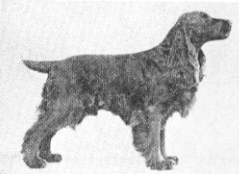
Dual Champion Arbury Squib
During WWII, field trials were scarce and the ACS had nearly disappeared
from the field. However, there were 2 trials in 1945 in the eastern part
of the US which drew 8 ECs and in 1947 Hollybrook Don completed a field
championship.
In that same year, Camino Boy, a black and white EC owned by H.C. McGrew
of Fortuna CA completed his field championship. By the end of 1950, Mr.
McGrew took Camino Boy to his bench championship, thereby creating the second
EC dual champion in the US.
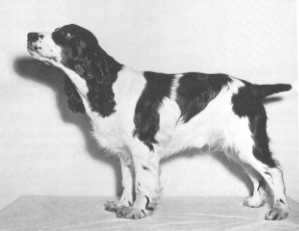
Dual Champion Camino Boy
Field trialing ebbed and flowed in popularity, and the Depression and WWII
made importation of british stock -- a necessity for increasing the breed's
population in the US -- very difficult. However, by the 1950's, EC fanciers
were able to acquire stock that had a long history of field as well as bench
performance, and local bloodlines had also begun to solidify. The first
Cocker National Field Trial was held in 1953 and a daughter of Dual Ch.
Camino's Boy, Camino's Cheetah, won her Natl. Fld. Ch. with ease. EC field
champions and National Field Champions continued to be made, in part with
the importation of International Fld. Champions, throughout the 1950s. By
1962, however, few ECs were being entered in field trial stakes in the US,
perhaps because the breed finally had sufficient autonomy and breeding momentum
for conformation results to take center stage.
In Britain, field trialing with English Cocker stock has continued without
interruption and the Eng. Ch. title continues to include proven field performance
as a requirement. (Conformation-only champions are titled Eng. Show Ch.)
By the mid-1970s, interest re-emerged in field testing ECs. Several EC breeders
and field handlers were involved in the definition of Working Dog tests
and served on the AKC advisory committee re: the creation of the J/S/MH
tests.
In 1977, the first WDX certificates were issued to ECs: Deborah Mason's
Amer./Can. Ch. Merryborne Minstrel and Sue Rose's Amer./Can. Ch. Rose's
Sherry Lenore, Amer. UDT, Can. UDTX. A WD was also awarded to Robt. and
Lorraine MacLennan's Ch. Mittenwald Gentian Andrew.
Attempts to revive field trialing with ECs have been made over the last
two decades and at present substantial momentum has gathered. Sue Rose.....
continues to be a leader in this movement.
Those who would judge the fitness of ECs for field use, especially within
the conformation lines, by the scarcity of dual champions must first take
into account the history of the breed in this country and compare that to
the breed's record elsewhere. It was not until 1946 that ECs could compete
in conformation on a "level playing field". And it was not until
the late 1950s that sufficient stock had been imported and bred to BEGIN
the process of developing lines with any substantial base.
When I was researching breeds, it was not uncommon to find wave patterns
in the development of the rarer spaniels -- large amounts of importation,
followed by home breeding, followed perhaps by the evolution of a distinctive
type and standard, followed again by a new, more selective wave of imports.
Whether or not this is what is currently happening in ECs, a significant
number of full Eng. Ch. have been imported to the US recently, and interest
in field training ECs is on the rise.
I submit that it is at least 25 - 50 years too soon to say whether or not
a field / show split is NECESSARY to produce outstanding excellence in either
arena. The limited gene pool which obtained for the first half of this century,
under the press of events muddied by the separatation of the cocker breeds,
simply does not allow well-founded judgements to be made at this point.
Robin Burk
Back to the Top

